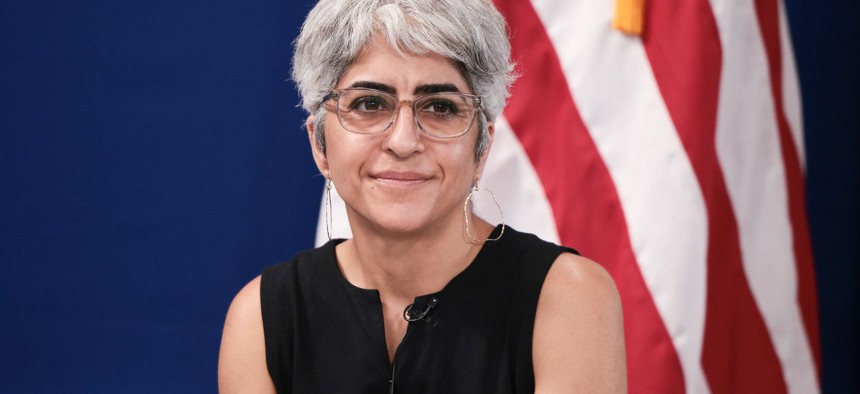
OPM Director Kiran Ahuja this week became the first Senate-confirmed director of the Office of Personnel Management to stay in the job for at least a year since 2015. She held a roundtable with reporters on Thursday. Anna Moneymaker/Getty Images
Coming Soon: More Regs and Bills to Help Modernize the Federal Workforce
Reforms will ease the process of everything from attracting new talent to processing retirement claims, says OPM Director Kiran Ahuja.
The director of the federal government’s human resources agency on Thursday touted her agency’s efforts over the last year to transform into a governmentwide leader on federal human capital, as well as its leadership on a number of key Biden administration initiatives like improving diversity, equity and inclusion at federal agencies.
Kiran Ahuja this week became the first Senate-confirmed director of the Office of Personnel Management to stay in the job for at least a year since 2015. In recent years, the job has been a lightning rod for controversy, from the 2015 breach of federal employees and job applicants’ personal data to the Trump administration’s unsuccessful efforts to scuttle the agency and roll back civil service protections for federal workers in policy-related positions.
In a discussion with reporters, Ahuja said central to her work since rejoining OPM—she served as the agency’s chief of staff in the Obama administration—has been to send the message to federal workers that they are valued.
“I’ve said it before, and I’ve said it to the workforce often: there’s no other place that I wanted to be [than OPM] when I was asked to come into this administration,” she said. “It’s so important, especially as we manage the post-pandemic work environment, to have a very strong human capital leader in the federal government, and that’s what we’re working to do.”
Since Ahuja’s confirmation, OPM has been at the center of a number of Biden administration initiatives, from implementing an executive order aimed at improving diversity, equity, inclusion and accessibility at federal agencies and helping agencies engage in surge hiring related to the bipartisan infrastructure law to overhauling the federal hiring process and revitalizing internship programs across the federal government.
But still on the to-do list are more reforms aimed at making it easier for agencies to attract new talent, overhauling a still largely paper-based retirement claims process that has seen its backlog grow due to the COVID-19 pandemic, and implementing recommendations from the National Academy of Public Administration to transform OPM from a transaction- and compliance-based model to one focused on becoming a governmentwide leader on strategic human capital management.
“We’re certainly making a dent, but there’s a lot more work to do,” Ahuja said.
On retirement processing, Ahuja said she’s taken advice from former OPM Director Linda Springer not to try to fix the system in one fell swoop, but rather through a “strategic and iterative process.” And she hopes that finally having some leadership stability will aid in the effort.
“Because OPM has had a fairly disruptive history, that’s taken attention away [from previous reform efforts],” she said. A big part of it has been that Retirement Services has been underfunded for the past number of years, and the administration had to build up staffing to be more customer service oriented, so we’ve got a number of staff coming in and are setting up a new cloud-based contact center . . . And we’re trying to make small modernizing changes such as, and this should not be novel, but scanning records and documents.”
Ahuja said her agency is also working on a number of regulatory changes and legislative proposals aimed at modernizing the civil service, particularly when it comes to recruitment and retention of workers. NAPA’s report on how to reform OPM stressed that the agency needs to delegate more of its authorities and conduct periodic oversight, rather than reviewing and authorizing every single request to waive existing rules.
“This piece on delegating authorities from the NAPA report, which we agreed with in our response, is part of our four-year strategic plan, and we have a team tied to the plan to find where we can take some of the burden off of agencies, particularly around delegation of authorities,” she said. “[We’ve] identified a number of those authorities that we’ll hopefully move out over the next few months and into next year.”
According to the Office of Management and Budget’s latest unified regulatory agenda, published Tuesday, OPM plans to roll out proposed regulations delegating the authority to waive caps on recruitment, retention and relocation incentives, grant agencies greater flexibility in appointing interns through the Pathways program and discouraging the use of salary histories in the federal hiring and pay-setting process.
On that last initiative, Ahuja said her agency has engaged with a number of gender equity and other affinity groups, who have urged OPM to ban the practice of soliciting or accepting job applicants’ salary history altogether, because of the potential for any exceptions to allow historical gender or race-based pay disparities to persist.
“The devil’s always in the details, but I know that my team has done a number of stakeholder engagement [meetings] on this to make sure that no stone is left unturned in the sense of all of the various machinations and iterations that we come up with,” she said.
NEXT STORY: 'It’s a Very Challenging Process to Get Through'







